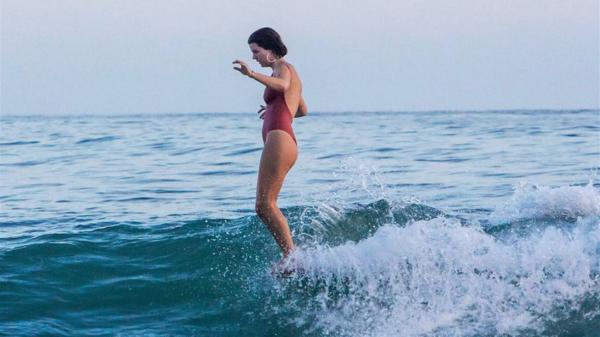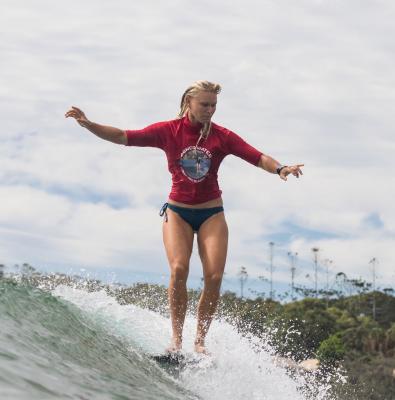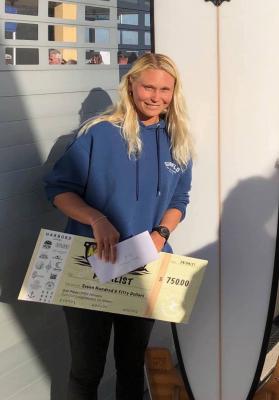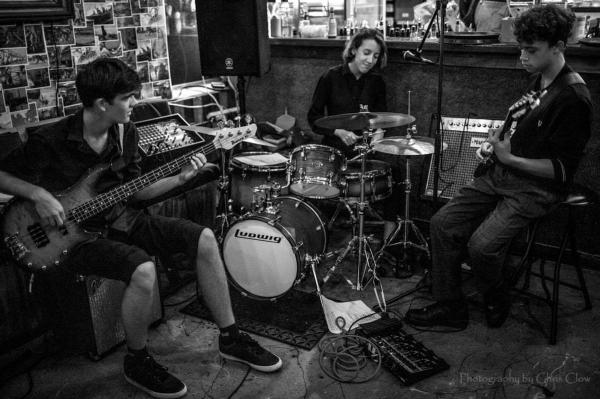By now longboarder Lucy Small’s courageous calling out of the Curly Mal Jam event for gender inequality has become the stuff of legend, as it should.
A forthright and eloquent spokesperson for women’s surfing, who also happens to be one hell of a longboarder, Lucy used the winner’s dais at Curl Curl on the Anzac weekend to protest the fact that she received $1500 prize money while the men’s pro winner received $4000. Two years since the governing body of pro surfing, the World Surf League, introduced equal purses, and in a year that a documentary about the battle of women to be taken seriously in surfing, Girls Can’t Surf, has been making waves around the country, this was bound to go viral, and it did.
Even the Sydney Morning Herald weighed in: “We are just so sick of this happening,” (Lucy) said. “I am just really tired of putting in so much time and effort and money and investing so much into going to these events … and getting less than half the reward.”
Although Lucy’s stand at the presentations was what grabbed the headlines, she certainly didn’t lack for support amongst the women competitors. Noosa’s Kirra Molnar, who finished second and pocketed a princely $750, kept her own counsel on the day but later wrote diplomatically to organiser Phil Nicol: “I understand that Curly can be a heavy break and so maybe you have fewer females competing, and have never had this issue in the past, or even thought of it before. This is why I believe it’s so important to bring it up now and help promote change, not just for Curly Longboard Club but throughout the surfing industry and for those that don’t even realise the issue.
“In saying this, I just want to let you know … that it is not my intention to bombard you … but support you in making it better … so the next generation of female surfers have equal opportunity.”
There are really no excuses any more for contests to divide the cake unequally, but it still happens, and it comes from a long history within the surfing culture – particularly in longboarding, where sponsorship dollars are harder to come by and event management tends to be still dominated by ageing baby boomers – of women being treated as second class citizens. The upcoming Noosa Festival of Surfing will offer equal prize money, but many smaller events are dragging the chain, citing the odd idea that equality will cost too much and drive sponsors away.
It’s already been proven that the opposite happens. The girls aren’t asking for more, just equality. And when the corporate sector sees events embracing this new ethos, they will back it.
So we are slowly getting the message, but it has taken a long time. When I ran the Noosa Festival of Surfing over a couple of decades not once did we pay the women as much as the men. There were all kinds of justifications for this, such as there are fewer women competitors than men so therefore fewer entry fees to throw at the purse, we got more sponsorship for the men’s events than the women’s, and the the elephant in the boardroom –girls can’t surf as well as men.
Well, if this last was ever true, it certainly hasn’t been for a long time. In all levels and forms of competitive surfing today, we see women performing brilliantly, but in traditional longboarding, you could even argue that they are more poised, more elegant, and a bigger drawcard than the men. As WSL longboard star Matt Chojnacki told Tracks magazine: “Of all the genres of surfing, longboarding is perhaps the most equal for both genders – it’s more of an artistic expression and women tend to be incredibly talented at it.”
By the end of last week, I felt sorry for the MalJam’s Phil Nicol, who’d been hounded by the media and had to carry the can for the club while personally feeling quite contrite. But nothing was done to rectify the situation until the altruistic Mark Kelly, CEO of surfboard distributor Global Surf Industries – a long-time supporter and former major sponsor of the Noosa Festival – coughed up $4850 to put things right.
Kel told Tracks: “I thought the days of women being paid less were over, to be honest. The World Surf League went to equal pay in 2019. There are a lot of women’s brands steering the surf industry.” He later put it in a nutshell for the SMH: “I did this for two reasons. Firstly it was a very brave move by Lucy to speak up, and secondly, it was great to see the Curly club own the issue and say they would change from next year.”
This is not the first time Kel has led from the front, and backed it with his cheque book. Let’s hope it inspires all surfing events to catch up with the times.
Surf Code + Myths this arvo
If you missed all the previous memos but you have a grom who’s learning to surf, drop everything and head for the food court at Noosa Civic at 4.30pm this afternoon (Friday May 7) for the launch of the Noosa World Surfing Reserve’s Surf Code video series for schools. Meet surf stars and Noosa ambassadors Jordan Mercer, Josh Constable, Dean Brady and Kirra Molnar, and catch a set from our very own teenage music sensation, The Myths. This is a free event with giveaways and lots of surprises. Groms of all ages, parents, teachers, coaches all welcome.










